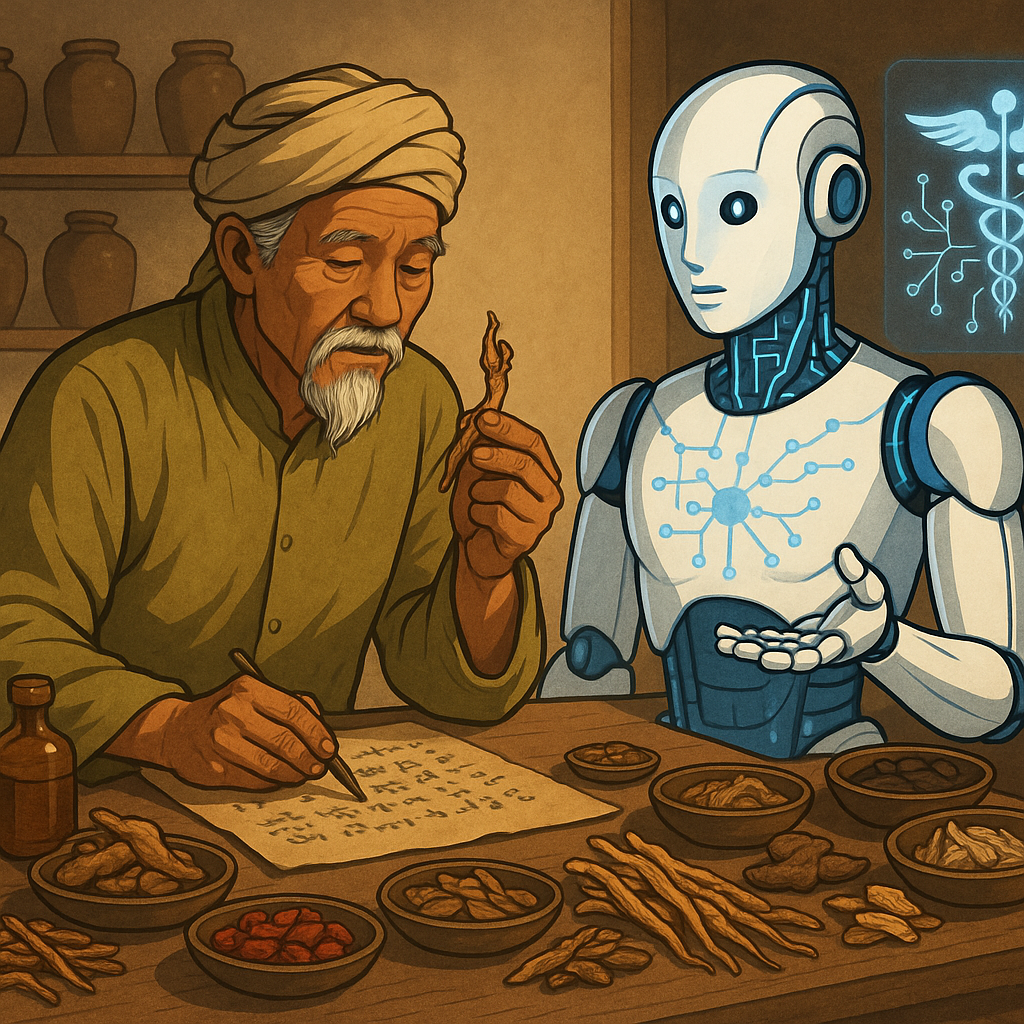AI and Traditional Medicine Unite to Shape a Safer, Smarter Health Future
The document is part of the broader Global Initiative on AI for Health, which aims to help all countries harness the benefits of AI in ways that are safe, ethical, and culturally respectful.

A technological revolution is quietly reshaping one of the oldest pillars of human healthcare: traditional medicine. As artificial intelligence (AI) expands its global footprint, it is now beginning to transform Traditional, Complementary, and Integrative Medicine (TCIM)—a system of healing practiced in over 170 countries and used by billions of people worldwide.
In a groundbreaking step to responsibly guide this convergence, the World Health Organization (WHO), International Telecommunication Union (ITU), and the World Intellectual Property Organization (WIPO) unveiled a new technical brief titled “Mapping the application of artificial intelligence in traditional medicine” at the AI for Good Global Summit. The document is part of the broader Global Initiative on AI for Health, which aims to help all countries harness the benefits of AI in ways that are safe, ethical, and culturally respectful.
The Rising Global Role of Traditional Medicine
As health systems seek holistic, affordable, and accessible solutions, TCIM is witnessing renewed interest. From Ayurveda and Traditional Chinese Medicine to African herbalism and Indigenous healing, these systems emphasize prevention, rehabilitation, and wellness. With growing attention to climate change, biodiversity, and mental health, many are turning to traditional knowledge for answers.
However, despite its widespread use, traditional medicine often exists in parallel to mainstream health systems, lacking robust research, regulation, or digital integration. That’s where AI-driven innovation could make a difference—if implemented thoughtfully.
Mapping Innovation: How AI Is Already Enhancing Traditional Medicine
The technical brief highlights diverse country-level innovations, showcasing AI’s potential to unlock new dimensions in health:
-
Ayurgenomics in India is using AI-powered diagnostic systems to personalize healthcare by linking traditional Ayurvedic classifications with genetic information.
-
In Ghana and South Africa, machine learning models are identifying medicinal plants for therapeutic use and conservation.
-
In the Republic of Korea, AI tools are analyzing traditional medicine compounds to treat blood disorders, helping bridge the gap between ancient remedies and modern science.
Beyond clinical applications, AI is aiding in biodiversity mapping, formulation optimization, and pharmacovigilance, offering new hope for evidence-based validation of centuries-old practices.
Data-Driven but Ethically Grounded
Central to AI's role in TCIM is the use of inclusive, high-quality datasets. Yet this raises critical questions around ownership, privacy, and cultural integrity.
The brief underscores the need for participatory design and ethical data governance. For instance, India's Traditional Knowledge Digital Library (TKDL) and the Virtual Health Library of the Americas are using AI to preserve Indigenous knowledge and prevent biopiracy—the unauthorized extraction or commercial use of traditional knowledge and biological resources.
As Edward Kwakwa, WIPO’s Assistant Director-General, noted, intellectual property (IP) frameworks are essential to ensure fair compensation and recognition. The recently adopted WIPO Treaty on Intellectual Property, Genetic Resources and Associated Traditional Knowledge serves as a milestone in safeguarding the contributions of Indigenous Peoples and local communities.
Indigenous Data Sovereignty and Community Empowerment
The document strongly advocates for Indigenous Data Sovereignty (IDSov) and Free, Prior, and Informed Consent (FPIC) as foundational pillars for deploying AI in traditional medicine contexts. Examples from Canada, New Zealand, and Australia illustrate successful models of community-led data governance, where local voices lead the design, access, and use of data derived from their traditions.
“AI must not become a new frontier for exploitation,” cautioned Dr Yukiko Nakatani, WHO Assistant Director-General for Health Systems. “We must ensure that Indigenous Peoples are not only protected but become co-creators of this new digital era.”
Economic Growth Meets Ethical Health Innovation
With the global TCIM market projected to approach $600 billion by 2025, the integration of AI could significantly amplify its growth and impact. Yet, with opportunity comes responsibility.
To avoid replicating historical patterns of marginalization, stakeholders must ensure that policies, legal frameworks, and digital infrastructure reflect the complexity, diversity, and rights embedded in traditional medicine systems.
A Holistic Framework for AI and Traditional Medicine
The technical brief outlines a global call to action for governments, academia, industry, and Indigenous communities:
-
Invest in Inclusive AI Ecosystems: Develop technologies that respect cultural diversity and uphold data sovereignty.
-
Design National Legal Frameworks: Explicitly address AI’s role in traditional medicine, covering safety, consent, and regulation.
-
Build Capacity and Digital Literacy: Equip traditional medicine practitioners with skills to navigate digital tools.
-
Standardize Data and Ethics Protocols: Establish global interoperability and AI ethics benchmarks for TCIM.
-
Safeguard Traditional Knowledge: Use AI-powered repositories and benefit-sharing models to ensure knowledge protection and equitable distribution.
Toward a Shared Future: Honoring Tradition, Embracing Technology
At the core of this initiative is the recognition that traditional medicine is not a relic of the past, but a living system of knowledge, continuously evolving and capable of embracing the future. The fusion of AI and traditional medicine can forge a path to personalized, inclusive, and resilient healthcare systems.
As the WHO, ITU, and WIPO lead this international effort, the message is clear: innovation must be paired with integrity. Only by ensuring informed consent, community control, and ethical use of data, can AI truly empower—not exploit—traditional medicine systems.
In this shared pursuit, the wisdom of ancient healing and the potential of cutting-edge technology are not opposites but allies, poised to co-create a more just, healthy, and equitable world.










